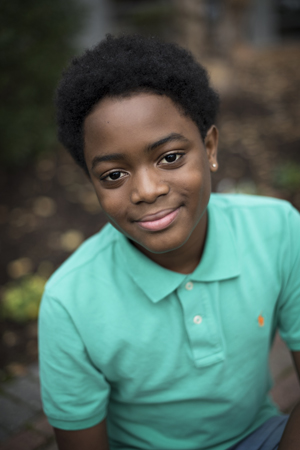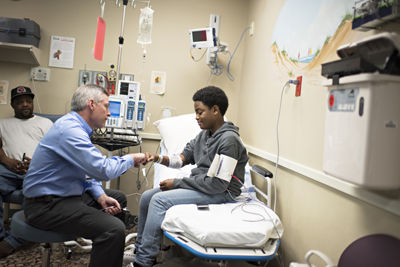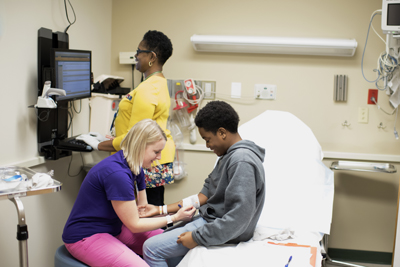Behind his shy smile and modest demeanor, 14-year-old Nasir Mason of Hampton has a lot to be proud of. He is an honor student at Phoebus High
 School, an experienced international traveler and a pretty fierce checkers player. With such an active life and bright outlook, it might be hard to believe that Nasir has also spent hundreds of hours over his lifetime at CHKD battling
sickle cell disease.
School, an experienced international traveler and a pretty fierce checkers player. With such an active life and bright outlook, it might be hard to believe that Nasir has also spent hundreds of hours over his lifetime at CHKD battling
sickle cell disease.
“Nasir’s first pain crisis happened when he was only 2 months old,” says Nasir’s mom, Sue-Ann. “I woke up at 2 a.m. to my son screaming at the top of his lungs. When I looked in to see what was wrong, I saw his hands were huge – they seemed like they were the size of a full grown adult. That was the start of our 14-year journey with CHKD.”
Sickle cell disease (SCD) is an inherited blood disorder in which the body produces an abnormal type of hemoglobin – the protein in red blood cells that carries oxygen from the lungs to the rest of the body. Typical red blood cells are round, flexible and move freely through blood vessels. For someone with sickle cell disease, like Nasir, some red blood cells take on a sickle or C-shape, making them stiff and sticky.
Sickled cells cause blockages in blood vessels, preventing the delivery of healthy blood and oxygen to nearby tissue. This can result in many serious issues including sudden episodes of severe pain, called pain crises. The pain, which can be as intense as childbirth, often occurs without any warning and can happen almost anywhere in the body.
“I’ve been bringing Nasir to CHKD basically all of his life,” says Sue-Ann. “When we first learned about sickle cell disease, it was daunting, but CHKD made us feel welcome and provided us with a ton of information and counseling.”
For most, SCD is a lifelong illness that has life-threatening effects on the body. In addition to pain crises, it can cause damage to major organs, long-term anemia, chronic pain, severe respiratory issues, infections and even stroke.
The Children’s Cancer and Blood Disorders Center at CHKD cares for approximately 500 children with SCD. The program is staffed by a multidisciplinary team that includes pediatric hematology physicians, nurse practitioners, trained nurse coordinators, social workers, an educational specialist, child life specialists and a nutritionist.
Dr. William Owen, a pediatric hematologist at CHKD, has been a part of Nasir’s care team since his first visit. “For kids with sickle cell disease,
 managing symptoms and reducing complications is key,” says Dr. Owen. “At CHKD, we have a state-of-the-art facility and provide various therapies, specialized pain management and other services to meet each child’s needs. Nasir had some complications early on, but over the years, we’ve watched him closely and developed a treatment plan that is working well.”
managing symptoms and reducing complications is key,” says Dr. Owen. “At CHKD, we have a state-of-the-art facility and provide various therapies, specialized pain management and other services to meet each child’s needs. Nasir had some complications early on, but over the years, we’ve watched him closely and developed a treatment plan that is working well.”
That plan includes daily medications and monthly visits to CHKD for transfusion therapy. Because SCD has caused a narrowing in the blood vessels leading to Nasir’s brain, he is at a higher risk of stroke. Receiving regular blood transfusions greatly reduces that risk. During five-hour clinic visits, some of Nasir’s blood is removed and replaced with a new supply containing healthy red blood cells to help decrease the occurrence of blockages and improve the delivery of oxygen throughout his body.
To pass the time during those treatments, Nasir watches movies, plays video games and finds ways for friendly competition with his care team. “My favorite thing about CHKD is that I have a place to get treated and have fun at the same time,” says Nasir, who has built a reputation around the clinic for his board game skills. “Challenging others to play games helps keep my time in the clinic exciting,” he says.
“Nasir can certainly play a strong game of checkers,” says Bryan Sellitti,
child life specialist at CHKD. “But his determination in his battle against sickle cell disease is even stronger. Over the years, Nasir has taught me that you cannot let a chronic illness limit you.”
Having spent so much time at CHKD, Nasir has built relationships with many members of his care team. He has shared his struggles and celebrated happy milestones, like birthdays and graduations, with them. Walking through the clinic, he can barely take more than two steps without someone waving hello and stopping to chat. When asked who some of his favorite people in the clinic are, he can easily list half a dozen names.
 And the team is not only there for Nasir, but for his family, too. “As a parent of a child with a chronic disease, I’ve experienced frustration, sadness and helplessness – but I’ve also experienced many happy moments,” says Sue-Ann. “And through it all, the staff at CHKD has been right alongside us. They feel like family.”
And the team is not only there for Nasir, but for his family, too. “As a parent of a child with a chronic disease, I’ve experienced frustration, sadness and helplessness – but I’ve also experienced many happy moments,” says Sue-Ann. “And through it all, the staff at CHKD has been right alongside us. They feel like family.”
Nasir, his family and his entire CHKD care team work together to make sure they are doing everything possible to prevent and control complications from SCD. It is important for Nasir to try to avoid situations that may set off a pain crisis, such as extreme heat or cold, abrupt changes in temperature, overexertion and dehydration.
He also makes regular visits to
Dr. Maripaz Morales, a pediatric allergy specialist at the
CHKD Health and Surgery Center at Oyster Point, to manage his
asthma and allergies which can compound his SCD. “Keeping his asthma and allergies in good control is very important for Nasir’s overall health,” says Dr. Morales. “An unexpected asthma flare-up could be problematic, and an allergy-related upper respiratory infection could put him in the hospital, especially if he has a fever.”
Nasir is just one of approximately 100,000 people living with SCD in the United States. The disease primarily affects African Americans, but also affects many people who come from Hispanic, southern European, Middle Eastern or Asian Indian backgrounds. Thanks to advances in treatment, the median life expectancy for people with SCD has increased from the teen years to approximately 50 years old in the last four decades.
In the summer of 2017, the FDA approved the first new drug for the treatment of SCD in almost 20 years. “I think there are more exciting things coming down the road,” says Dr. Owen. “When I began caring for kids with sickle cell, it was a little frustrating. We were treating symptoms after they occurred. Now with advances in screening and treatment, including new medications, stem cell transplant and the potential for gene therapy, we can actually prevent pain and strokes from ever happening.”
Nasir will have to manage his SCD for the rest of his life, but with the support of his family and CHKD, his future is bright. He is interested in pursuing a career in the technology field and plans to someday be a computer engineer. “Nasir is a remarkable young man. He doesn’t let the challenges of having sickle cell disease hold him back,” says Dr. Owen. “Helping kids like Nasir is what motivates me every day.”
This story appeared in the Winter 2018 edition of Kidstuff magazine, a quarterly publication from CHKD that features inspiring stories about patients, families, physicians and friends of CHKD. Make a donation to receive Kidstuff magazine by mail.